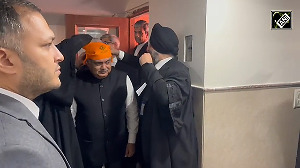Fresh from a truce with the Left parties on the India-United States civil nuclear deal, Prime Minister Manmohan Singh on Friday said India cannot afford to miss the bus of nuclear renaissance.
Singh said fast reactor technologies should be expeditiously developed and efforts intensified to locate additional uranium resources in the country.
There is a talk the world over of a nuclear renaissance and "we cannot afford to miss the bus or lag behind these global developments," Dr Singh said in Tarapur.
The prime minister was speaking at a function to dedicate two high-efficiency nuclear reactors to the nation in the township in Maharashtra's Thane district.
The prime minister said India "is now too important a country to remain outside the international mainstream" in the critical area of nuclear energy.
He said international cooperation cannot become effective until the Nuclear Suppliers Group adapts its guidelines to enable nuclear commerce with India.
The NSG itself has made it clear that they will not do so till the India-specific safeguards agreement with the International Atomic Energy Agency is finalised.
"Once these steps are taken, India can commence civil nuclear cooperation with all the 45 members of the NSG. This will signal the end of our international isolation of the past few decades," Dr Singh said.
"We have set a modest target of 20,000 MW of nuclear power generation by the year 2020. This can be doubled with the opening up of international cooperation," the prime minister said.
Dr Singh said there is a need to pave way for India to benefit from nuclear commerce without restrictions.
"We need to enable our industries to gain access to cutting edge technology, and we need to create opportunities for our scientists to participate in the international exchange of scientific ideas and technical know-how," he said.
The prime minister said cooperation will not be dependent on any one country and supplies will be sourced from many of the countries in the NSG including the United States, Russia, France and Japan.
Dr Singh said the proven resources of coal, oil, gas and hydropower were insufficient to meet the country's requirements and India, which is clocking nine per cent growth rate, required energy from all known sources.
"The energy we generate has to be affordable, not only in terms of its financial cost, but in terms of the cost to our environment, he said adding nuclear power is recognised as an important and environmentally benign constituent of the overall energy mix.
Dr Singh said the three-stage nuclear power programme formed the bedrock of the country's long-term strategy.
"This unique thorium-based technology will become an economically viable alternative over a period of time," he said, stressing the need to harness vast thorium resources.
Underlining the need to augment nuclear power capabilities, Dr Singh said there is a need to supplement uranium supplies from elsewhere though the Department of Atomic Energy had taken a number of steps to maximise output within the limited resources.
"We must take decisive steps to remove the uncertainties that result from shortfall in fuel supplies to avoid disruptions in our nuclear power production," he said.
Addressing nuclear scientists, the prime minister said "with your dedication and track record of accomplishments, I am confident that our domestic technological capability will only grow in strength."
"I have full confidence in our scientists and engineers and believe that the removal of iniquitous restrictions and shackles on our programme will enhance our indigenous capabilities.
"A strong nuclear energy programme is in our vital interest and is important for our scientific development, energy needs and security," Dr Singh said.





